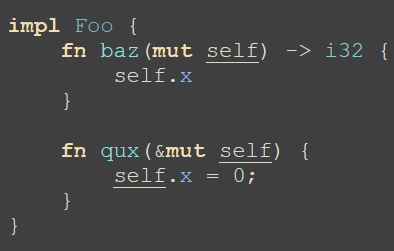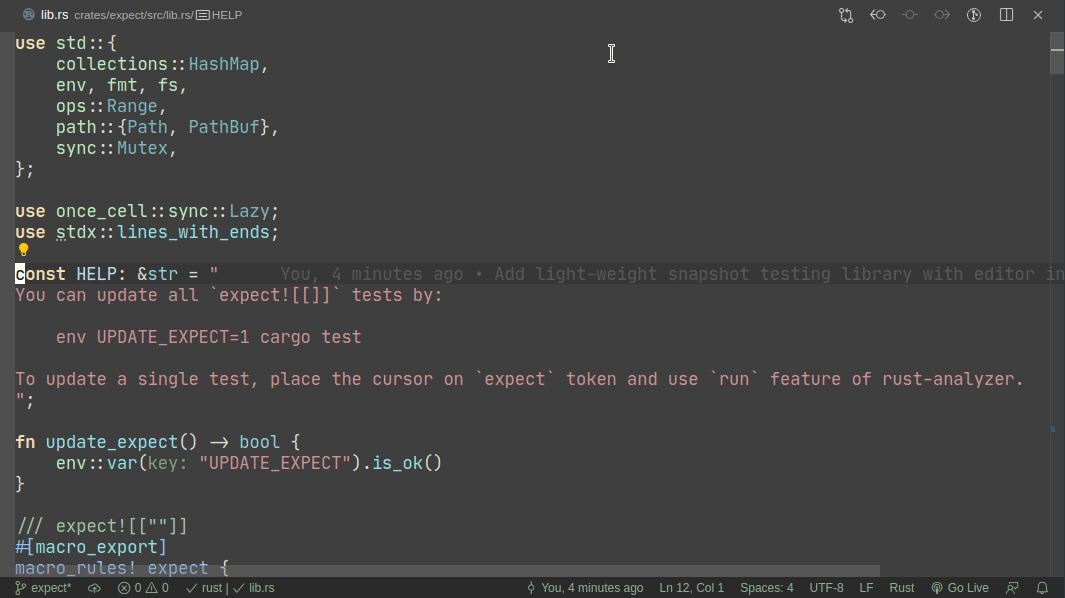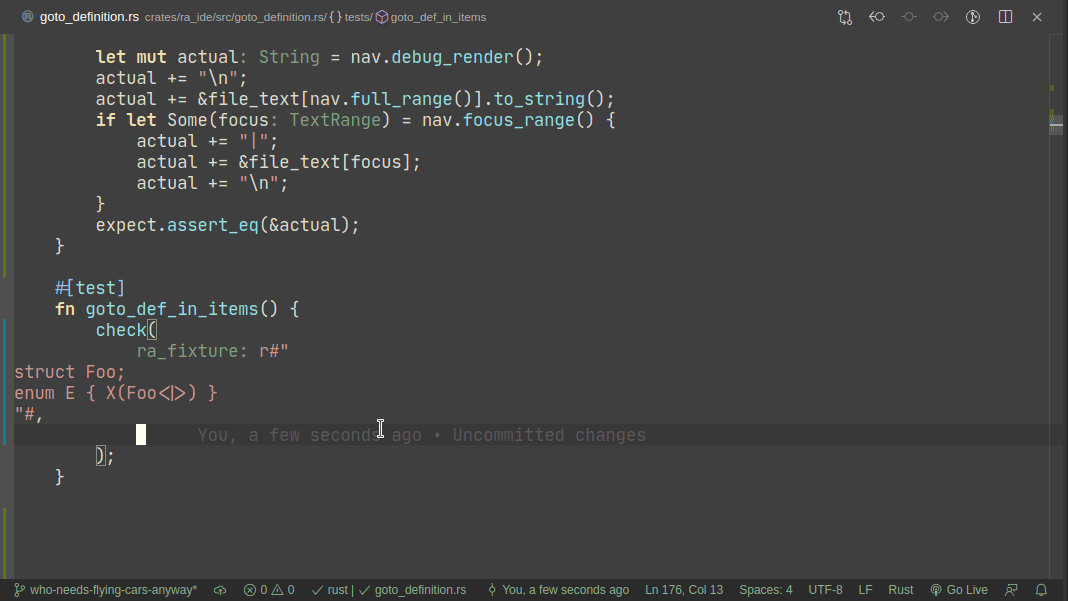5451: Highlight more cases of SyntaxKind when it is a punctuation r=matklad a=GrayJack
This maybe closes#5406
Closes #5453
Separate what one expect to be a punctuation semantic token (like `,`, `;`, `(`, etc), and what is not (`&`, `::`, `+`, etc)
5463: Bump lexer r=matklad a=kjeremy
Since we're now on rust 1.45
5465: Bump chalk r=matklad a=kjeremy
5466: Do not show default types in function and closure return values r=matklad a=SomeoneToIgnore
Avoid things like
<img width="522" alt="image" src="https://user-images.githubusercontent.com/2690773/87985936-1bbe4f80-cae5-11ea-9b8a-5383d896c296.png">
Co-authored-by: GrayJack <gr41.j4ck@gmail.com>
Co-authored-by: kjeremy <kjeremy@gmail.com>
Co-authored-by: Kirill Bulatov <mail4score@gmail.com>
5423: Correctly resolve assoc. types in path bindings r=matklad a=jonas-schievink
Previously invoking goto def on `impl Iterator<Item<|> = ()>` would go to `Iterator`, not `Item`. This fixes that.
Co-authored-by: Jonas Schievink <jonasschievink@gmail.com>
5345: Semantic Highlighting: Emit mutable modifier for 'self' when applicable r=matklad a=Veykril
This PR implements emitting the mutable modifier for the self keyword when applicable for semantic highlighting as mentioned in #5041. The rendered highlighting test html file:

As you can see it does not emit the modifier when `self` is not used in a mutable context even if it is declared mutably in the enclosing function. I'm not sure if this is actually something wanted or not.
Co-authored-by: Lukas Wirth <lukastw97@gmail.com>
4996: Correctly generate new struct field in file containing struct def r=matklad a=TimoFreiberg
WIP because the test doesn't pass.
Testing the fix by hand looked good, although quickfixes seem to not support setting the editor cursor yet, which i think we want for "generate missing defs from usage" fixes.
Co-authored-by: Timo Freiberg <timo.freiberg@gmail.com>
5270: Add argument count mismatch diagnostic r=matklad a=jonas-schievink
Closes https://github.com/rust-analyzer/rust-analyzer/issues/4025.
This currently has one false positive on this line, where `max` is resolved to `Iterator::max` instead of `Ord::max`:
8aa10c00a4/crates/expect/src/lib.rs (L263)
(I have no idea why it thinks that `usize` is an `Iterator`)
TODO:
* [x] Tests
* [x] Improve diagnostic text for method calls
Co-authored-by: Jonas Schievink <jonas.schievink@ferrous-systems.com>
5116: Categorize assists r=matklad a=kjeremy
Categorize assists so that editors can use them. Follows the LSP spec pretty close (and some things may need adjustments) but this populates the Refactor menu in vscode and pushes quickfixes through again.
This is a prerequisite to filtering out assists that the client doesn't care about.
Fixes#4147
Co-authored-by: Jeremy Kolb <kjeremy@gmail.com>
Co-authored-by: kjeremy <kjeremy@gmail.com>
5089: Disable auto-complete on comments r=matklad a=BGluth
Resolves#4907 by disabling any auto-completion on comments.
As flodiebold [pointed out](https://github.com/rust-analyzer/rust-analyzer/issues/4907#issuecomment-648439979), in the future we may want to support some form of auto-completion within doc comments, but for now it was suggested to just disable auto-completion on them entirely.
The implementation involves adding a new field `is_comment` to `CompletionContext` and checking if the immediate token we auto-completed on is a comment. I couldn't see a case where we need to check any of the ancestors, but let me know if this is not sufficient. I also wasn't sure if it was necessary to add a new field to this struct, but I decided it's probably the best option if we want to potentially do auto-completion on doc comments in the future.
Finally, the three tests I added should I think ideally not filter results by `CompletionKind::Keyword`, but if I want to get unfiltered results, I need access to a non-public function [get_all_completion_items](9a4d02faf9/crates/ra_ide/src/completion/test_utils.rs (L32-L39)) which I don't know if I should make public just for this.
5161: SSR: Add initial support for placeholder constraints r=matklad a=davidlattimore
5184: Always install required nightly extension if current one is not nightly r=matklad a=Veetaha
This is weird, but having switched back to stable by uninstalling the extension appears that vscode doesn't destroy the `PersistentState` and thus changing to `nightly` channel doesn't work because the last check for nightly extension was less than 1 hour ago. The simple solution is to skip this check if we know that the current extension version is not nightly.
5185: Force showing extension activation error pop-up notification r=matklad a=Veetaha
Fixes https://github.com/rust-analyzer/rust-analyzer/issues/5091
5186: fix: correct pd/ppd/tfn/tmod completion doc r=matklad a=fannheyward
a33eefa3b2/crates/ra_ide/src/completion/complete_snippet.rs (L23-L24)
Co-authored-by: BGluth <gluthb@gmail.com>
Co-authored-by: David Lattimore <dml@google.com>
Co-authored-by: Veetaha <veetaha2@gmail.com>
Co-authored-by: Heyward Fann <fannheyward@gmail.com>
5175: More memory-efficient impl collection r=matklad a=jonas-schievink
This saves roughly 90 MB in `ImplsFromDepsQuery`, which used to copy the list of all impls from libcore into *every* crate in the graph. It also stops collecting inherent impls from dependencies entirely, as those can only be located within the crate defining the self type.
Co-authored-by: Jonas Schievink <jonas.schievink@ferrous-systems.com>
This makes the intention of inherent vs. trait impls somewhat more
clear and also fixes (?) an issue where trait impls with an unresolved
trait were added as inherent impls instead (hence the test changes).
5101: Add expect -- a light-weight alternative to insta r=matklad a=matklad
This PR implements a small snapshot-testing library. Snapshot updating is done by setting an env var, or by using editor feature (which runs a test with env-var set).
Here's workflow for updating a failing test:

Here's workflow for adding a new test:

Note that colorized diffs are not implemented in this PR, but should be easy to add (we already use them in test_utils).
Main differences from insta (which is essential for rust-analyzer development, thanks @mitsuhiko!):
* self-updating tests, no need for a separate tool
* fewer features (only inline snapshots, no redactions)
* fewer deps (no yaml, no persistence)
* tighter integration with editor
* first-class snapshot object, which can be used to write test functions (as opposed to testing macros)
* trivial to tweak for rust-analyzer needs, by virtue of being a workspace member.
I think eventually we should converge to a single snapshot testing library, but I am not sure that `expect` is exactly right, so I suggest rolling with both insta and expect for some time (if folks agree that expect might be better in the first place!).
# Editor Integration Implementation
The thing I am most excited about is the ability to update a specific snapshot from the editor. I want this to be available to other snapshot-testing libraries (cc @mitsuhiko, @aaronabramov), so I want to document how this works.
The ideal UI here would be a code action (💡). Unfortunately, it seems like it is impossible to implement without some kind of persistence (if you save test failures into some kind of a database, like insta does, than you can read the database from the editor plugin). Note that it is possible to highlight error by outputing error message in rustc's format. Unfortunately, one can't use the same trick to implement a quick fix.
For this reason, expect makes use of another rust-analyzer feature -- ability to run a single test at the cursor position. This does need some expect-specific code in rust-analyzer unfortunately. Specifically, if rust-analyzer notices that the cursor is on `expect!` macro, it adds a special flag to runnable's JSON. However, given #5017 it is possible to approximate this well-enough without rust-analyzer integration. Specifically, an extension can register a special runner which checks (using regexes) if rust-anlyzer runnable covers text with specific macro invocation and do special magic in that case.
closes#3835
Co-authored-by: Aleksey Kladov <aleksey.kladov@gmail.com>